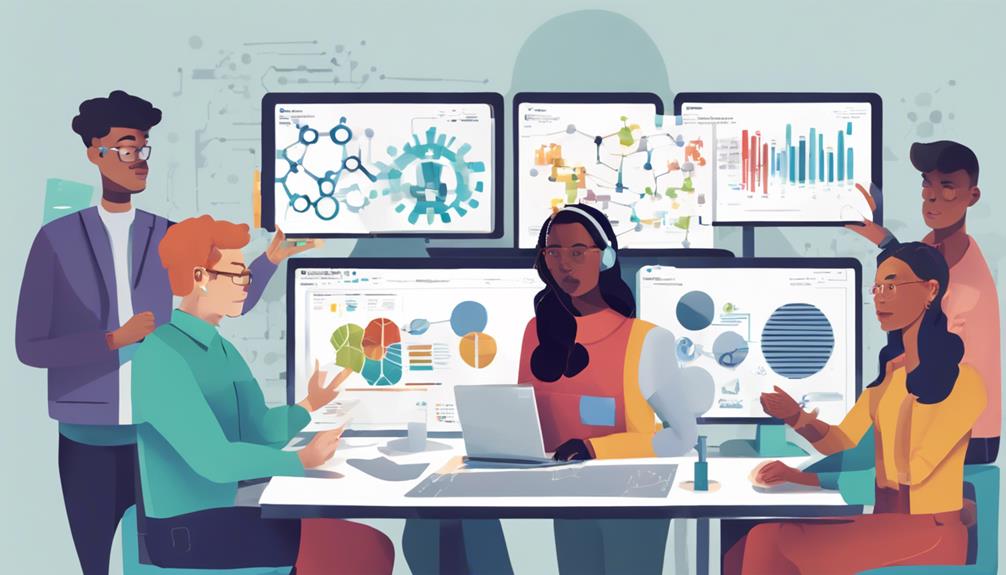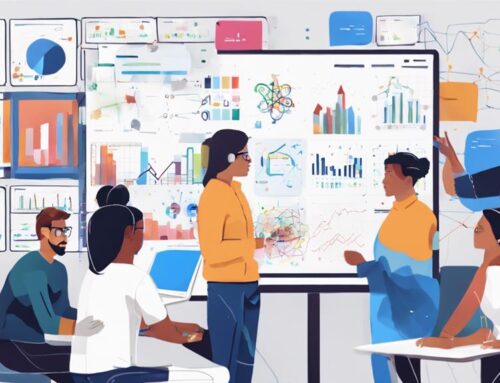In the realm of data science consulting, navigating the landscape of essential skills needed for data science consulting can feel akin to embarking on a complex puzzle where each piece holds significance. As you embark on this journey, the mastery of Python and R programming languages, coupled with a deep understanding of machine learning algorithms and data visualization techniques, stands as the foundation of your success. However, there are further layers to uncover, each contributing uniquely to your proficiency in this dynamic field. Are you equipped with the tools to decode this enigma and emerge as a sought-after data science consultant?
Python Programming
When delving into the realm of data science consulting, proficiency in Python programming is paramount. Python’s versatility and simplicity make it a go-to language for various tasks, including data manipulation and algorithm development. In data science consulting, the ability to efficiently manipulate data is crucial for extracting insights and making informed decisions. Python provides powerful libraries like Pandas and NumPy, which facilitate tasks such as cleaning, transforming, and analyzing data sets.
Moreover, in algorithm development, Python’s readability and vast library support enable consultants to implement complex algorithms with ease. Whether it’s developing machine learning models or creating custom algorithms for specific business needs, Python offers a rich ecosystem of tools and frameworks like scikit-learn and TensorFlow.
Machine Learning
Utilizing machine learning is a fundamental aspect of data science consulting. In this field, you are expected to have a strong understanding of deep learning applications and algorithm optimization. Deep learning applications involve neural networks that can handle vast amounts of data and extract meaningful insights. As a data science consultant, you must be proficient in implementing and fine-tuning these deep learning models to solve complex problems efficiently.
Algorithm optimization is another crucial skill in machine learning. You need to have the ability to optimize algorithms to enhance performance, reduce computational costs, and improve accuracy. This involves exploring different optimization techniques, such as gradient descent variants, to fine-tune models and make them more effective in handling large datasets.
Having a deep understanding of both deep learning applications and algorithm optimization will allow you to tackle intricate data science projects with confidence and deliver valuable insights to clients. Mastering these skills will set you apart as a proficient data science consultant in the competitive industry.
Data Visualization
When it comes to data science consulting, understanding the importance of visualizations is key. Utilizing tools for visualization can help you present complex data in a clear and engaging manner. Communicating data effectively through visual representations can enhance decision-making processes and facilitate better understanding among stakeholders.
Importance of Visuals
Data visualization plays a crucial role in the field of data science consulting. Visual storytelling and data presentation techniques are essential components that enable data scientists to communicate complex findings effectively. Visuals provide a powerful medium to convey insights, patterns, and trends hidden within vast datasets. Through compelling visualizations, you can simplify intricate information, making it more accessible and engaging for clients or stakeholders.
Effective data visualization enhances decision-making processes by enabling quick comprehension of data-driven insights. By presenting information visually, you can highlight key takeaways and communicate findings in a structured and impactful manner. Visuals not only aid in understanding data but also help in identifying correlations and outliers that might go unnoticed in raw data.
In data science consulting, the ability to create meaningful and visually appealing representations of data is a valuable skill. Mastering data presentation techniques allows you to craft narratives that resonate with your audience, leading to better-informed decisions and actionable outcomes.
Tools for Visualization
To effectively visualize data in the field of data science consulting, you need to leverage specific tools that enhance your ability to convey insights in a compelling manner. Interactive dashboards play a crucial role in data visualization by allowing users to interact with the data dynamically, enabling them to explore trends and patterns effectively. Tools like Tableau, Power BI, and Qlik Sense are popular choices for creating interactive dashboards that can be customized based on client requirements.
In addition to interactive dashboards, mastering infographic design is essential for creating visually appealing representations of complex data. Infographics combine data visualization with graphic design techniques to present information in a clear and engaging way. Tools such as Canva, Piktochart, and Venngage offer user-friendly platforms for designing impactful infographics that communicate key insights at a glance.
Communicating Data Effectively
For effective communication of data in the realm of data science consulting, the utilization of visual aids is paramount. Storytelling with data is a powerful tool that enables you to convey complex information in a compelling and easy-to-understand manner. By creating visual representations of your data, such as charts, graphs, and infographics, you can effectively communicate key insights to your audience.
Presentation skills play a crucial role in conveying your message clearly and engagingly. When presenting data, it is essential to structure your information logically, highlight key findings, and use visuals to support your narrative. A well-designed presentation can enhance the impact of your data and help your audience grasp the significance of the insights you are sharing.
Statistics
When it comes to data science consulting, having a strong foundation in statistics is crucial. You need to be well-versed in statistical modeling techniques to analyze complex datasets effectively. Additionally, data interpretation skills and proficiency in statistical software are essential for drawing meaningful insights from the data you work with.
Statistical Modeling Techniques
Amidst the complex landscape of data science consulting, proficiency in statistical modeling techniques stands as a pivotal skill set. Predictive analytics, a key component of statistical modeling techniques, enables consultants to forecast future trends and outcomes based on historical data patterns. By employing various regression models, time series analysis, and machine learning algorithms, consultants can develop accurate predictive models that drive informed decision-making.
Furthermore, hypothesis testing plays a crucial role in statistical modeling by allowing consultants to validate assumptions and draw conclusions about the significance of relationships within data sets. This skill is vital in determining the reliability and credibility of insights derived from statistical analyses.
In mastering statistical modeling techniques, consultants enhance their ability to extract meaningful insights, identify patterns, and make data-driven recommendations to clients. By leveraging predictive analytics and hypothesis testing, consultants can deliver valuable solutions that optimize business strategies and drive organizational success in the dynamic field of data science consulting.
Data Interpretation Skills
Within the realm of data science consulting, proficiency in data interpretation skills, particularly statistics, is paramount. Data interpretation involves more than just understanding numbers; it requires the ability to extract meaningful insights and make informed decisions based on the data at hand. Critical thinking plays a crucial role in data interpretation, allowing you to question assumptions, identify patterns, and uncover hidden relationships within the data.
Data storytelling techniques are another essential aspect of data interpretation skills. Being able to effectively communicate your findings through compelling narratives helps stakeholders grasp the significance of the data and facilitates decision-making processes. By mastering the art of data storytelling, you can convey complex information in a clear and impactful manner.
Statistical Software Proficiency
Proficiency in statistical software is a key component of data interpretation skills in the field of data science consulting. Data analysis, a fundamental aspect of statistical software proficiency, involves extracting meaningful insights from large datasets. By mastering statistical software tools like R, Python, or SAS, you can effectively analyze data and identify trends, patterns, and anomalies. These skills are crucial for generating actionable recommendations based on data-driven insights.
Furthermore, predictive modeling, another significant facet of statistical software proficiency, enables data scientists to forecast future trends and outcomes. Through techniques like regression analysis, machine learning algorithms, and time series forecasting, you can build models that predict future events with a high degree of accuracy. This predictive capability is invaluable in helping businesses make informed decisions and develop strategies to achieve their goals.
R Programming
When working in data science consulting, mastering R programming is essential for effectively analyzing and visualizing data. Here are three key points to consider when delving into R programming:
- R Programming Best Practices: Understanding and implementing best practices in R programming is crucial for creating efficient and maintainable code. This includes writing clear and concise code, commenting effectively, and following a consistent coding style.
- R Programming vs. Python Programming: While both R and Python are popular languages in data science, R is often preferred for statistical analysis and data visualization tasks due to its extensive library of packages specifically designed for these purposes. Python, on the other hand, is more versatile for general-purpose programming and has a larger user base.
- Visual Data Analysis: R’s robust graphical capabilities make it ideal for visual data analysis. Mastering R’s visualization packages like ggplot2 can help you create compelling visualizations to better communicate insights from your data.
Hadoop
To effectively handle large-scale data processing and storage in the field of data science consulting, familiarity with Hadoop is crucial. Hadoop, an essential tool in the big data realm, is renowned for its ability to manage vast amounts of data efficiently. Understanding the Hadoop ecosystem, which consists of various components like HDFS (Hadoop Distributed File System) and MapReduce, is essential for working with big data effectively.
Hadoop clusters play a pivotal role in distributing data processing tasks across multiple nodes, enabling parallel processing and enhancing overall performance. Data scientists proficient in Hadoop can leverage its capabilities to process and analyze massive datasets, making informed decisions based on the insights derived.
Apache Spark
Having established a solid foundation in handling large-scale data with Hadoop, it’s time to shift focus to another powerful tool in the data science consulting realm: Apache Spark.
Key Points on Apache Spark:
- Spark Integration: Apache Spark is a fast, in-memory data processing engine with elegant and expressive development APIs in Java, Scala, Python, and R. Its ability to handle complex analytics workflows, streaming data, and machine learning tasks efficiently makes it a valuable asset for data science consultants.
- Consulting Applications: Spark’s flexibility and scalability make it ideal for various consulting applications, including real-time data processing, ETL processes, predictive analytics, and graph processing. Its compatibility with different data sources and seamless integration with other big data tools enhance its consulting utility.
- Performance Boost: Compared to traditional Hadoop MapReduce, Apache Spark provides significant performance improvements due to its in-memory processing capabilities. This speed advantage enables consultants to deliver faster insights and analysis to clients, making Spark a crucial skill for data science consulting professionals.
Data Mining
Data mining plays a pivotal role in the data science consulting domain, enabling professionals to extract valuable insights and patterns from vast datasets. When dealing with text data, data mining techniques are crucial for uncovering hidden patterns within unstructured text sources. By applying natural language processing and machine learning algorithms, data scientists can analyze text data to derive meaningful insights, sentiment analysis, and topic modeling.
Furthermore, data mining is essential for building predictive models that can forecast future trends and outcomes based on historical data. Predictive modeling, a key aspect of data mining, allows consultants to develop algorithms that make informed predictions, such as customer behavior, market trends, or financial forecasts. These models help businesses make strategic decisions and optimize their processes by leveraging data-driven insights.
Communication Skills
Communication skills are fundamental in the realm of data science consulting, serving as a bridge between complex analytical findings and actionable insights for stakeholders. To excel in this area, consider the following key points:
- Effective Presentations: The ability to convey technical information in a clear and compelling manner is crucial. Data scientists must be able to distill complex findings into digestible insights that resonate with audiences of varying backgrounds.
- Client Interactions: Building strong relationships with clients is essential for successful data science consulting. Clear and concise communication with clients helps in understanding their needs, aligning expectations, and delivering results that meet their requirements.
- Cross-functional Collaboration: Communication skills are vital for fostering collaboration across different teams within an organization. Data scientists often need to work with experts from various fields, and effective communication ensures that everyone is on the same page, leading to more impactful outcomes.
Mastering communication skills in data science consulting can significantly enhance your ability to deliver valuable insights and drive impactful decisions for your clients.
Frequently Asked Questions
How Important Is Domain Knowledge in Data Science Consulting?
In data science consulting, domain expertise plays a crucial role. Understanding industry insights enables better problem-solving and tailored solutions. Your grasp of specific areas enhances the effectiveness of data analysis and recommendations, elevating your consulting impact.
What Are the Typical Challenges Faced in Real-World Data Science Projects?
In real-world data science projects, you’ll face data quality challenges, stakeholder communication hurdles, technical implementation obstacles, and time/resource constraints. Overcoming these is vital for project success, requiring adaptability, collaboration, and problem-solving skills.
How Do Data Science Consultants Stay Updated With Industry Trends?
To stay current with industry trends, data science consultants engage in continuous learning. They attend industry webinars, read relevant publications, and participate in online forums. This proactive approach helps them adapt to the evolving landscape of data science.
What Role Does Ethics Play in Data Science Consulting Projects?
Ethical considerations are crucial in data science consulting. Upholding data privacy builds trust in client relationships. Ensuring project outcomes align with ethical standards fosters credibility and long-term success. Integrating ethics into every step is key for impactful consulting projects.
How Can Data Science Consultants Effectively Manage Client Expectations?
To effectively manage client expectations, you must excel in communication strategies. By setting clear project timelines and managing deliverables, you can ensure client satisfaction. Remember, meeting deadlines and transparently communicating progress are key to success.




